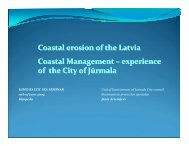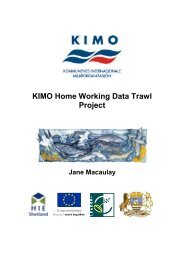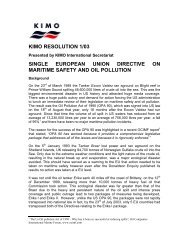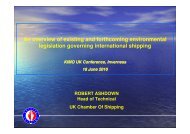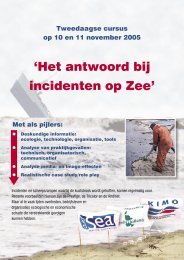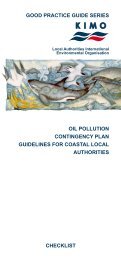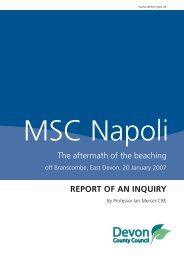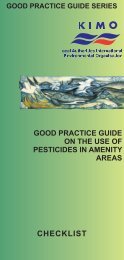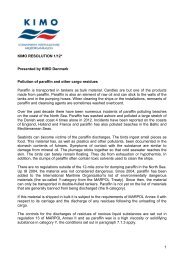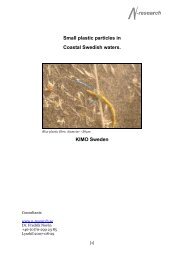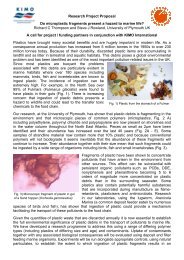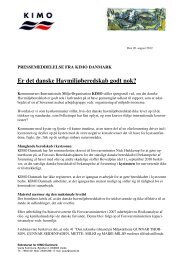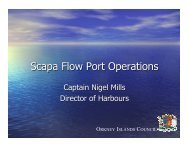Elimination of Inputs of Radioactive Substances - KIMO
Elimination of Inputs of Radioactive Substances - KIMO
Elimination of Inputs of Radioactive Substances - KIMO
You also want an ePaper? Increase the reach of your titles
YUMPU automatically turns print PDFs into web optimized ePapers that Google loves.
<strong>KIMO</strong> RESOLUTION 6/01<br />
Presented by <strong>KIMO</strong> UK<br />
ELIMINATION OF INPUTS OF RADIOACTIVE<br />
SUBSTANCES INTO THE MARINE<br />
ENVIRONMENT AND THE SELLAFIELD<br />
REPROCESSING PLANT<br />
In 1998 all the Signatories to the OSPAR Convention for the prevention <strong>of</strong><br />
marine pollution in the North East Atlantic agreed on progressive and<br />
substantial reductions <strong>of</strong> radioactive discharges, emissions and losses <strong>of</strong><br />
radioactive substances, with the ultimate aim <strong>of</strong> concentrations in the<br />
environment near background values for naturally occurring radioactive<br />
substances and close to zero for artificial radioactive substances.<br />
All contracting states, including the states with reprocessing industries,<br />
namely France and the UK, agreed that discharges, emissions and losses <strong>of</strong><br />
radioactive substances are reduced by the year 2020 to levels where the<br />
additional concentrations in the marine environment above historic levels,<br />
resulting from such discharges, emissions and losses, are close to zero.<br />
In addition the OSPAR states noted the concerns expressed by a number <strong>of</strong><br />
Contracting Parties about increases in technetium-99 discharges from<br />
Sellafield and their view that these discharges should cease.<br />
At the OSPAR 2000 annual meeting OSPAR Decision 2000/1 was adopted<br />
calling for a review <strong>of</strong> all discharges from reprocessing plants with a view to<br />
implementing the 'non-reprocessing option' for spent nuclear fuel, i.e. dry<br />
storage.<br />
At OSPAR 2001 several contracting states called for an immediate reduction<br />
in the technetium-99 discharge authorisation levels at Sellafield to the level<br />
that existed before it was increased substantially. Continued concerns were<br />
expressed at technetium-99 discharges from Sellafield, levels <strong>of</strong> which have<br />
increased six-fold since 1996 along the Norwegian coast and which a recent<br />
study found increased levels in the Barents Sea and other northern seas.<br />
OSPAR 2001 agreed that the review <strong>of</strong> discharge authorisations from<br />
reprocessing plants, with a view to implementing the non-reprocessing option<br />
for spent fuel, which was adopted as policy in 2000 should be carried out "as<br />
a matter <strong>of</strong> urgency". The UK, France and Switzerland abstained from the<br />
vote. (OSPAR Decision 2001/1)<br />
Against this background <strong>of</strong> this international concern over the widespread<br />
pollution caused by radioactive discharges from Sellafield, there are now new
fears that radioactive discharges from Sellafield will increase over the next<br />
three years according to British Nuclear Fuels documents. Some discharges<br />
will increase either two-fold or four-fold, peaking in time for the next meeting<br />
<strong>of</strong> at the OSPAR 2003 Environment Ministers Meeting. The increased<br />
discharges fly in the face <strong>of</strong> commitments made by the UK to reduce<br />
radioactive discharges at the 1998 Ministerial Meeting.<br />
<strong>KIMO</strong><br />
Having regard that radioactive discharges present a real threat to<br />
communities around Northern Seas and that Northern Seas<br />
communities all rely on clean seas - and a public perception <strong>of</strong> clean<br />
seas - for their seafood, tourist and agricultural industries,<br />
Having concerns for the increasing discharges <strong>of</strong> radioactive wastes<br />
from Europe's nuclear reprocessing plants, in particular Sellafield and<br />
discharges <strong>of</strong> technetium-99,<br />
Having regard for the views <strong>of</strong> the majority <strong>of</strong> Contracting Parties to the<br />
OSPAR Convention that the 'non-reprocessing option' should be<br />
adopted for spent nuclear fuel,<br />
Agrees to,<br />
(1) Support the efforts <strong>of</strong> the Contracting Parties to the OSPAR<br />
Convention in reducing radioactive discharges all radioactive<br />
discharges to 'close to zero' by 2020<br />
(2) Support the calls by the majority <strong>of</strong> OSPAR Contracting Parties for<br />
the adoption <strong>of</strong> the 'non-reprocessing option' for spent nuclear fuel<br />
(3) Support the concerns over existing and the proposed increased<br />
discharges from Sellafield, in particular discharges <strong>of</strong> technetium-99<br />
(4) Call on all Northern Sea States to take all possible actions to support<br />
the above aims<br />
(5) submit this Resolution to all National Government, the European<br />
Commission and other relevant agencies<br />
*This Resolution was agreed unanimously by Delegates at the 11 th <strong>KIMO</strong> International Annual General Meeting in<br />
Göteborg, Sweden on October 14 th 2001 and became <strong>KIMO</strong> policy upon that date.<br />
resl601



